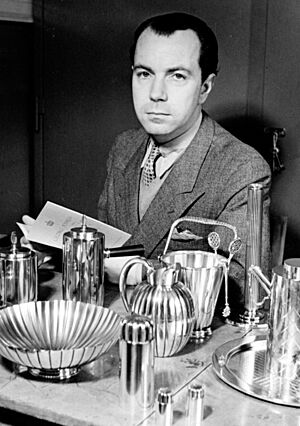Sigvard Bernadotte facts for kids
Quick facts for kids Sigvard Bernadotte |
|||||
|---|---|---|---|---|---|
| Prince Bernadotte prev. Duke of Uppland |
|||||

Bernadotte in 1944
|
|||||
| Born | Prince Sigvard, Duke of Uppland 7 June 1907 Stockholm Palace, Stockholm, Sweden |
||||
| Died | 4 February 2002 (aged 94) Stockholm, Sweden |
||||
| Burial | 15 February 2002 Royal Cemetery, Solna, Sweden |
||||
| Spouse |
Erica Maria Patzek
(m. 1934; div. 1943)Sonja Helene Robbert
(m. 1943; div. 1961)Marianne Lindberg Tchang
(m. 1961) |
||||
| Issue | Michael Bernadotte, Count of Wisborg | ||||
|
|||||
| House | Bernadotte | ||||
| Father | Gustaf VI Adolf | ||||
| Mother | Margaret of Connaught | ||||
Sigvard Oscar Fredrik, Prince Bernadotte, Count of Wisborg (born June 7, 1907 – died February 4, 2002) was a member of the Swedish Royal Family. He was also a very successful industrial designer.
He was born as Prince Sigvard of Sweden, Duke of Uppland. His father was King Gustaf VI Adolf, and his mother was Princess Margaret of Connaught. She was the granddaughter of Britain's Queen Victoria.
In 1934, Sigvard married a woman who was not from a royal family. Because of this, he lost his royal titles and his place in the line to the throne. The King decided he should be called "Mr. Sigvard Bernadotte" in Sweden. Later, in 1951, he received a new title from Luxembourg: "Count of Wisborg". He later declared himself "Prince Sigvard Bernadotte" in 1983.
Sigvard Bernadotte was the uncle of King Carl XVI Gustaf of Sweden. He was also the uncle of Queen Margrethe II of Denmark.
Contents
Designing a Career
Sigvard Bernadotte was an industrial designer. This means he designed many different products. He was known for creating everything from fancy silver items to everyday plastic household goods.
Famous Designs
Some of his most famous designs include:
- The Red Clara opener, a kitchen tool.
- The EKA Swede 38 folding knife.
- The Margrethe bowl, named after his niece Queen Margrethe II of Denmark.
- The Bernadotte jug.
- The Facit Private typewriter.
- He also designed frames for glasses.
Work in Film
Sigvard Bernadotte also worked in the film industry. He was an assistant director at MGM in Culver City, California. He helped with the 1937 film The Prisoner of Zenda as a technical advisor.
Family Life and Marriages
Sigvard Bernadotte was married three times during his life.
First Marriage
He first married Erica Maria Regina Rosalie Patzek on March 8, 1934. Their wedding took place in London. After this marriage, Sigvard lost his royal privileges. He then started his silver design business. They divorced in 1943.
Second Marriage
He married Sonja Helene Robbert on October 26, 1943. They had one son named Michael, born in 1944. Michael later married Christine Wellhofer and they had a daughter named Kajsa. Kajsa has two daughters, Sophia and Linnea. Sigvard and Sonja divorced in 1961.
Third Marriage
Lastly, Sigvard married Swedish actress Marianne Lindberg Tchang on July 30, 1961.
Understanding His Titles
Sigvard was born a Prince of Sweden and Duke of Uppland. However, marrying someone who was not royal meant he could no longer use these titles. He was simply called "Mr. Bernadotte".
Becoming a Count
On July 2, 1951, he was given a new title by Grand Duchess Charlotte of Luxembourg. He became a Count of Wisborg. In this official document, he was also called "Sigvard Oscar Frederik Prince Bernadotte".
Claiming His Princely Title
For many years, there was disagreement in Sweden about his titles. In 1983, Sigvard announced that he wanted to be known as "Prince Sigvard Bernadotte". He felt he should have this title based on what happened with his great-uncle, Oscar, who also lost his royal titles but was later recognized as a Prince by Luxembourg.
Sigvard tried to get the Swedish government to recognize his princely title. However, the European Court of Human Rights declared his request could not be accepted after he passed away. His gravestone, which is owned by the King, states that he was "born Prince of Sweden".
Honors and Awards
Sigvard Bernadotte received several honors during his lifetime.
Orders and Decorations

 Commander Grand Cross of the Order of the Polar Star (1952)
Commander Grand Cross of the Order of the Polar Star (1952)
 King Gustaf V's Jubilee Commemorative Medal (1928)
King Gustaf V's Jubilee Commemorative Medal (1928)
 King Gustaf V's Jubilee Commemorative Medal II (1948)
King Gustaf V's Jubilee Commemorative Medal II (1948)
Arms
See also
- Swedish Act of Succession
- Instrument of Government (1809)
 | Toni Morrison |
 | Barack Obama |
 | Martin Luther King Jr. |
 | Ralph Bunche |




